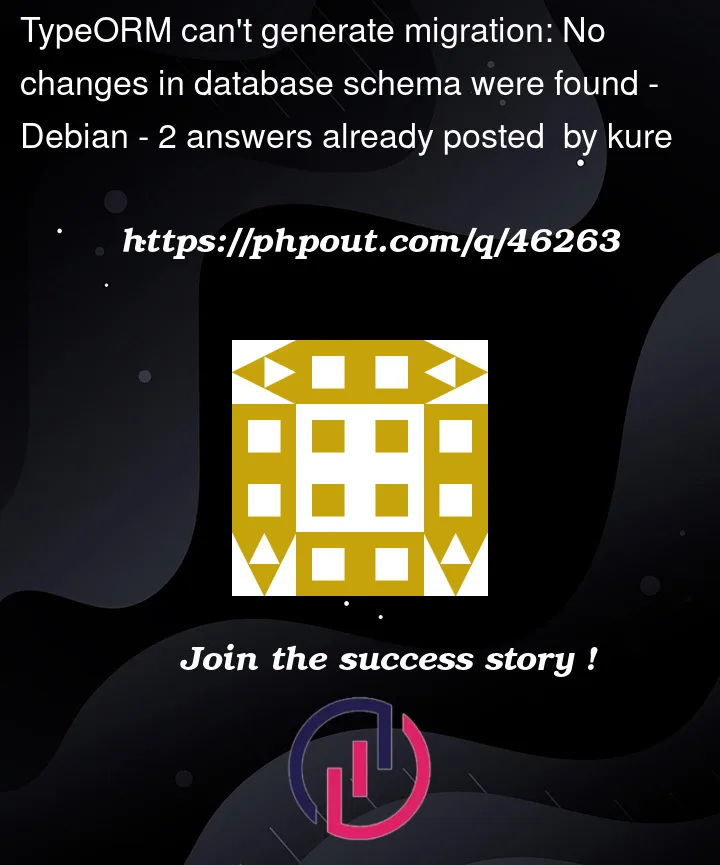I’ve read about 100 stack overflow posts, a few dozen reddit posts, and watched a handful of youtube videos. I cannot for the life of me get typeorm to generate a migration.
I’m quite sure the problem is that the entities glob is not catching my entities but nothing I try works.
here’s my data source file
import { DataSource, DataSourceOptions } from "typeorm";
export const dataSourceOptions: DataSourceOptions = {
type: 'postgres',
host: 'localhost',
port: 5432,
username: 'postgres',
password: 'example',
database: 'postgres',
migrations: ['.src/migrations/*{.ts,.js}'],
// entities: ['src/entities/*{.ts,.js}'],
// entities: ['./src/entities/*{.ts,.js}'],
// entities: ['dist/src/entities/*{.ts,.js}'],
// entities: ['./dist/src/entities/*{.ts,.js}'],
// entities: [`${__dirname}/src/entities/*{.ts,.js}`],
// entities: [`${__dirname}/dist/src/entities/*{.ts,.js}`],
// entities: [Item,Brand,Product,Size,Value], // this one came with import statements too
entities: ['dist/src/entities/*{.ts,.js}'],
}
const dataSource = new DataSource(dataSourceOptions);
export default dataSource;
the comments are all of the different things I’ve tried to get it to work
my code is a NestJs project that is structured like
project-name
├──data-source.ts
├──src
│ └──entities
│ └──item.js
│ └──brand.js
│ └──size.js
│ └──value.js
│ └──product.js
heres an example entity
import { Entity, Column, PrimaryGeneratedColumn, ManyToOne, JoinColumn } from 'typeorm';
import { Brand } from './brand';
@Entity()
export class Product {
@PrimaryGeneratedColumn("uuid")
id: string;
@Column()
msrp: number;
@Column()
name: string;
@ManyToOne(type => Brand)
@JoinColumn({ name: "brand" })
brand: Brand;
}
the application works if I synchronize via nest but that’s not the point so i emptied the database.
> docker exec -it 0dcfd4457db2 sh
# psql -U postgres
psql (15.2 (Debian 15.2-1.pgdg110+1))
Type "help" for help.
postgres=# dt
Did not find any relations.
postgres=# d
Did not find any relations.
my dependencies:
"dependencies": {
"@nestjs/common": "^9.0.0",
"@nestjs/config": "^2.3.1",
"@nestjs/core": "^9.0.0",
"@nestjs/mapped-types": "*",
"@nestjs/platform-express": "^9.0.0",
"@nestjs/typeorm": "^9.0.1",
"pg": "^8.10.0",
"reflect-metadata": "^0.1.13",
"rxjs": "^7.2.0",
"typeorm": "^0.3.12"
},
"devDependencies": {
"@nestjs/cli": "^9.0.0",
"@nestjs/schematics": "^9.0.0",
"@nestjs/testing": "^9.0.0",
"@types/express": "^4.17.13",
"@types/jest": "29.2.4",
"@types/node": "18.11.18",
"@types/supertest": "^2.0.11",
"@typescript-eslint/eslint-plugin": "^5.0.0",
"@typescript-eslint/parser": "^5.0.0",
"eslint": "^8.0.1",
"eslint-config-prettier": "^8.3.0",
"eslint-plugin-prettier": "^4.0.0",
"jest": "29.3.1",
"prettier": "^2.3.2",
"source-map-support": "^0.5.20",
"supertest": "^6.1.3",
"ts-jest": "29.0.3",
"ts-loader": "^9.2.3",
"ts-node": "^10.9.1",
"tsconfig-paths": "4.1.1",
"typescript": "^4.7.4"
},
for each of the above data source configs i’ve tried: npx’ing typeorm, typeorm-ts-node-esm, typeorm-ts-node-commonjs. i’ve tried various package.json scripts such as:"typeorm": "npm run build && npx typeorm -d ./data-source.js", "typeorm": "./node_modules/.bin/ts-node ./node_modules/.bin/typeorm", and "typeorm": "node --require ts-node/register ./node_modules/typeorm/cli.js"
in every single case where I don’t get an error I get No changes in database schema were found - cannot generate a migration.




2
Answers
As you mentioned, unfortunately, TypeORM cannot detect entities using directories. I can’t find any solutions either.
To resolve this issue, you have to manually import all your entities and pass them to the entities option.
You Can follow this:
https://github.com/MIShuvro/dream-tour
** My Orm Config File:**
package.json